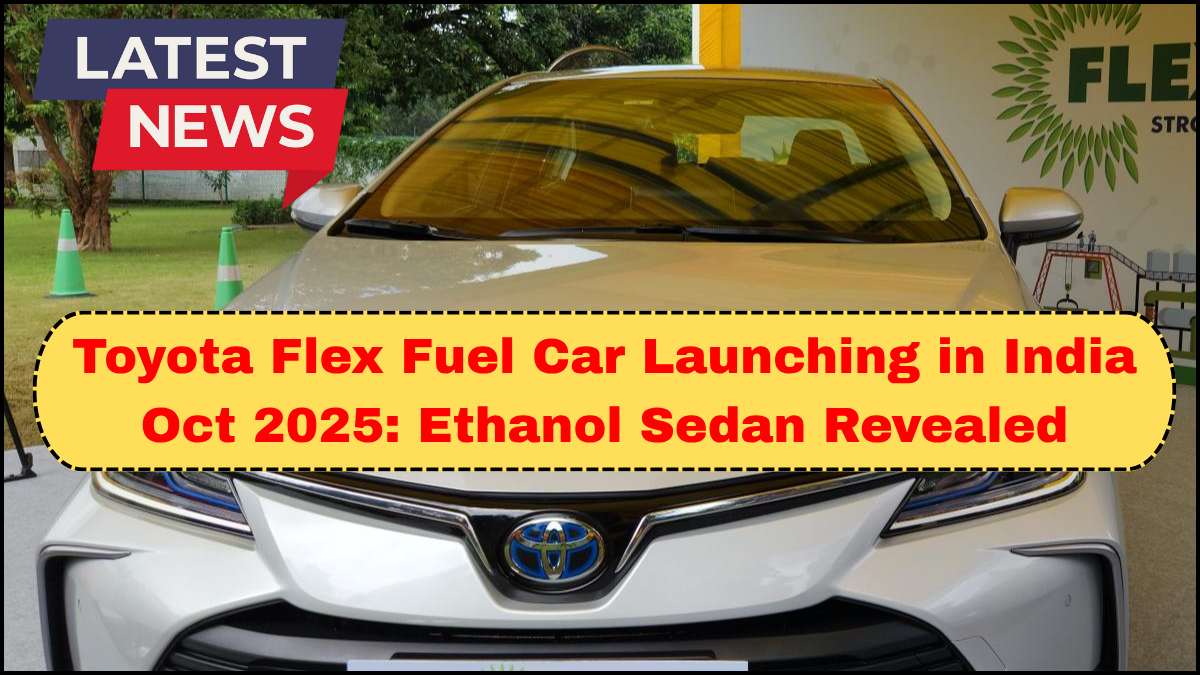Toyota is preparing to redefine sustainable mobility in India with the official launch of its Flex Fuel Car in October 2025. Designed to run on ethanol-blended fuels, this cutting-edge sedan reflects the company’s strong commitment to India’s clean energy future. With increasing government support for alternative fuels and growing environmental concerns, Toyota’s ethanol-powered vehicle is a timely addition to the Indian automotive landscape.

What Is a Flex Fuel Car?
A flex fuel vehicle (FFV) is equipped with an internal combustion engine capable of operating on more than one type of fuel. Most commonly, these cars can run on gasoline or a blend of gasoline and ethanol—usually up to 85% ethanol (E85). The engine is designed to automatically detect the fuel mixture and adjust performance accordingly, without requiring any input from the driver.
Toyota’s new flex fuel sedan for India embraces this versatile fuel capability, aiming to provide an eco-friendly alternative without compromising on driving experience.
Why Toyota Flex Fuel Car in India Matters
India is the world’s third-largest automobile market and also one of the most polluted. As such, the demand for cleaner and more sustainable vehicle technologies has never been more urgent. Toyota’s decision to introduce its flex fuel car in India aligns perfectly with the Indian government’s Ethanol Blending Program (EBP), which targets a nationwide ethanol blending rate of 20% by 2025.
Toyota’s move serves two strategic purposes:
-
Sustainability Focus: By introducing an ethanol-powered vehicle in 2025, Toyota supports India’s transition to cleaner fuels that significantly reduce carbon emissions.
-
Energy Independence: Ethanol is primarily derived from biomass such as sugarcane and maize. Promoting flex fuel cars can decrease India’s reliance on crude oil imports, helping to improve energy security.
The New Ethanol Sedan: What to Expect
The upcoming sedan will be the first Toyota flex fuel car in India, and early prototypes suggest a refined, mid-size design similar to the popular Toyota Corolla. Key features expected include:
-
E85 compatibility: The engine will efficiently run on fuel containing up to 85% ethanol.
-
BS6 Stage-II compliance: Ensuring it meets India’s latest emissions norms.
-
Fuel sensor technology: Real-time adaptation to varying fuel compositions.
-
Affordable running costs: Thanks to ethanol’s lower price compared to petrol.
In addition, the car will feature advanced infotainment systems, connected car tech, multiple airbags, and robust structural safety—meeting Toyota’s global safety standards.
India’s Ethanol Push: A Growing Market
The launch of a Toyota ethanol-powered vehicle in 2025 is not occurring in isolation. Several initiatives are underway to make ethanol more accessible across the country:
-
Expansion of fuel stations: Indian Oil, Bharat Petroleum, and HPCL are rapidly increasing ethanol-blended fuel distribution points.
-
Incentives for sugar mills: The government is incentivizing ethanol production by allowing more sugar mills to convert molasses into fuel-grade ethanol.
-
Ethanol roadmap: The Ministry of Road Transport and Highways is actively supporting OEMs to produce ethanol-compatible vehicles.
These changes make it the right time for Toyota to introduce a car that aligns with India’s clean fuel strategy.
How This Impacts the Automotive Industry
Toyota’s entry into the flex fuel segment will likely have a ripple effect. Other automakers may accelerate their own ethanol-powered vehicle 2025 timelines to stay competitive. Moreover, this could drive innovation in hybrid and biofuel tech, giving Indian consumers more sustainable vehicle options.
Consumer Benefits
Indian buyers can expect several advantages from this shift:
-
Lower fuel costs: Ethanol-blended fuels are often priced lower than regular petrol.
-
Reduced carbon footprint: Ethanol combustion emits significantly less CO₂ and pollutants.
-
Incentives and tax benefits: Governments may offer registration and road tax rebates for green vehicles in the future.
FAQs
Q1: What is the expected launch date for the Toyota flex fuel car in India?
A: Toyota has confirmed the launch for October 2025.
Q2: What type of fuel will the vehicle use?
A: It will run on a flexible range of fuels, including gasoline and ethanol blends up to E85.
Q3: Will the Toyota flex fuel car cost more than regular petrol cars?
A: Initial costs may be slightly higher due to advanced fuel tech, but lower running costs and maintenance could offset the difference over time.
Q4: Where can I find ethanol-blended fuel in India?
A: Ethanol-blended fuels are available across a growing network of petrol pumps, particularly in Maharashtra, Uttar Pradesh, Karnataka, and Tamil Nadu.
Q5: Is ethanol safe for my engine?
A: Yes, flex fuel engines are specially designed to handle ethanol blends without compromising engine health or performance.
click here to learn more